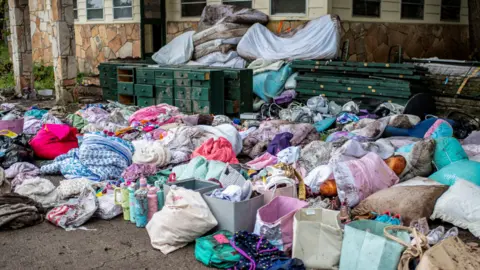'Huge wall of water': Texas man stood on meter box to survive deadly floods
When Christian Fell saw floodwater beginning to fill his home in Hunt, Texas, last Friday, it was already too late.
The Texan was one of hundreds forced to evacuate his home as flash floods swept through south central Texas, killing 120 people in the state, including 95 - as of Wednesday - in Kerr County where Mr Fell lives.
Mr Fell told the BBC that he tried to leave through his kitchen to get to his truck in the pitch black, but when he opened the door a "huge wall of water" came toward him.
"I tried closing the door, and I couldn't get that done because just how powerful the water was, and so I had to go back further into the house," he said.
Mr Fell found his furniture now floating in the water in his home and climbed over it, making it to his bedroom. There, he said, he spotted a window, swam through it and climbed on top of an outside meter box - where he stood for three hours.
He only climbed down when he saw a police officer walking in the street.
"I was clinging on to the side of the house, just praying the water would stop," he said.
Mr Fell said he did not receive any weather alerts until water was already in his house.
At least 36 children and 59 adults have died in the floods in Kerr County alone, Kerr County Sheriff Larry Leitha said at a news conference on Wednesday.
Officials are continuing their extensive search and rescue missions, using heavy equipment to remove debris, police said.
Mr Leitha said more than 150 people were still missing in the county as of Wednesday morning, including five campers and a counsellor from Camp Mystic, a Christian all-girls summer camp on the banks of the Guadalupe River.
Emergency responders often rely on a combination of local census data, eyewitness interviews, and families requesting help finding loved ones to compile lists of missing people after a natural disaster, said Irwin Redlener, Columbia University professor and founding director of the National Center for Disaster Preparedness.
"Especially in a flood, there could be survivors who are injured or isolated by being carried by floodwaters," Prof Redlener told BBC.
"But as we get further and further out from the disaster itself, then our confidence that we're still going to find survivors goes down very rapidly."
In the first hour of the floods on Friday, emergency responders evacuated over 100 homes and rescued over 200 people, waking people and pulling them from their residences, said Jonathan Lamb, community services officer for the Kerrville Police Department (KPD).
"Folks, I don't know how many lives our KPD team saved in an hour in Kerrville, but I know that this tragedy, as horrific as it is, could have been so much worse," Mr Lamb said.
Maria Paula Zarate and Silvana Garza Valdez were working as counselors at Camp Mystic, the Christian girls' camp in Kerr County, when the Guadalupe River began to rise early Friday.
 REUTERS/Sergio Flores
REUTERS/Sergio FloresMs Zarate said neither she nor the campers could sleep when the rain started because it was so loud. "It was a storm like I had never experienced before in my life," Ms Garza Valdez said.
She saw the camp waterfront crumbling with dirt and mud, and said some of the counselors started to cry when they were told to evacuate, with Army trucks coming to rescue them.
"I felt like I was in a dream," she said.
Ms Zarate noted that the river was "full of furniture that had come from other camps."
Questions have been raised about whether authorities provided adequate flood warnings before the disaster, and why people were not evacuated earlier.
Experts say there were a number of factors that contributed to the tragedy in Texas, including extreme weather, the location of some homes and timing.
Governor Greg Abbott said authorities had issued a storm warning and knew about a possible flash flood, but "didn't know the magnitude of the storm".
